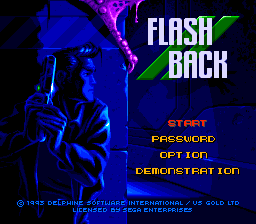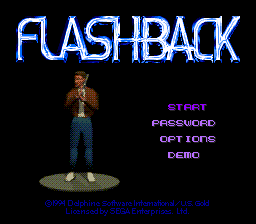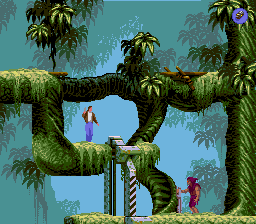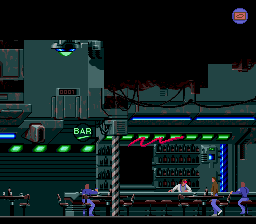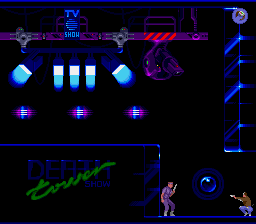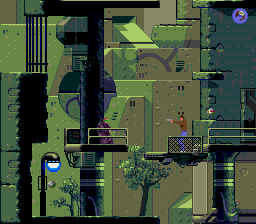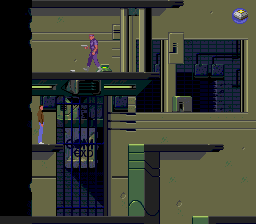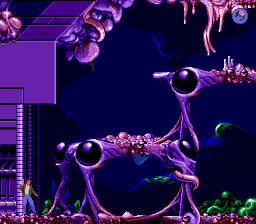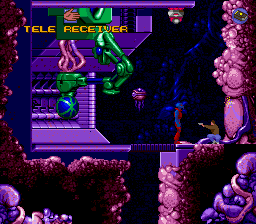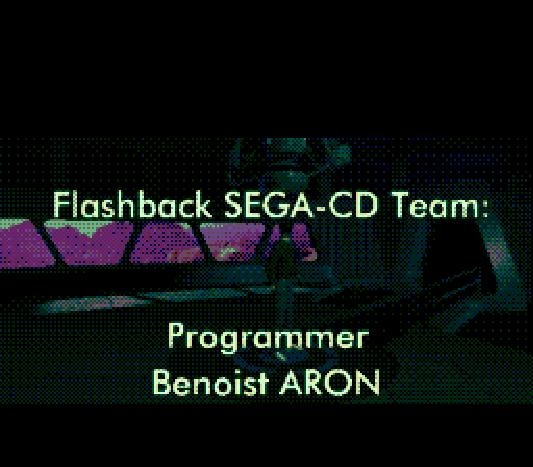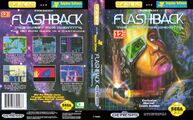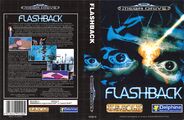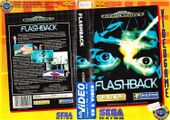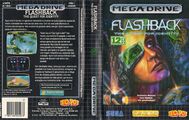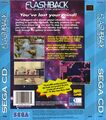Difference between revisions of "Flashback"
From Sega Retro
m (→Levels) |
|||
| (20 intermediate revisions by 7 users not shown) | |||
| Line 1: | Line 1: | ||
| + | {{otherPage|desc=the [[Sega Dreamcast]] game|page=Flashback (Dreamcast)}} | ||
{{Bob | {{Bob | ||
| bobscreen=Flashback Title.png | | bobscreen=Flashback Title.png | ||
| Line 8: | Line 9: | ||
| publisher={{company|[[U.S. Gold]]}} | | publisher={{company|[[U.S. Gold]]}} | ||
{{company|[[Sunsoft]]|system=MD|region=JP}} | {{company|[[Sunsoft]]|system=MD|region=JP}} | ||
| − | {{company|[[Sega]]|system=MCD}} | + | {{company|[[Sega of America]]|system=MCD}} |
| developer=[[Delphine Software International]] | | developer=[[Delphine Software International]] | ||
| + | | distributor={{company|[[Ecofilmes]]|region=PT|system=MD}} | ||
| + | {{company|[[Hent Gruppen]]|region=SE rental|system=MD}} | ||
| + | {{company|[[Tec Toy]]|system=MD|region=BR}} | ||
| system=[[Sega Mega Drive]], [[Sega Mega-CD]] | | system=[[Sega Mega Drive]], [[Sega Mega-CD]] | ||
| sounddriver={{MD}} [[GEMS]] | | sounddriver={{MD}} [[GEMS]] | ||
| Line 24: | Line 28: | ||
| md_code_us=T-79066 | | md_code_us=T-79066 | ||
| md_rrp_us=64.95{{magref|vgce|50|32}} | | md_rrp_us=64.95{{magref|vgce|50|32}} | ||
| + | | md_date_us_sc=199x | ||
| + | | md_rrp_us_sc=sub | ||
| + | | md_rating_us_sc= | ||
| md_date_eu=1993-06{{magref|mega|16|26}}{{magref|mdag|10|15}} | | md_date_eu=1993-06{{magref|mega|16|26}}{{magref|mdag|10|15}} | ||
| md_code_eu=79066-50 | | md_code_eu=79066-50 | ||
| − | | md_date_uk=1993-06{{magref|mega|16|26}}{{magref|mdag|10|15}} | + | | md_date_uk=1993-06{{magref|mega|16|26}}{{magref|mdag|10|15}}<!--1993-05{{magref|segapro|20|20}}--> |
| md_code_uk=79066-50 | | md_code_uk=79066-50 | ||
| md_rrp_uk=39.99{{magref|cvg|156|71}}{{magref|mega|9|53}}<!--44.99{{magref|segapro|15|15}}{{magref|megatech|17|57}}--> | | md_rrp_uk=39.99{{magref|cvg|156|71}}{{magref|mega|9|53}}<!--44.99{{magref|segapro|15|15}}{{magref|megatech|17|57}}--> | ||
| Line 45: | Line 52: | ||
}} | }} | ||
| esra=12 | | esra=12 | ||
| − | | otherformats={{NonSega|Amiga|ARC|CDI|IBMPC|FMTOWNS|JAG|Mac|PC9801VX|PC9801UX|SNES}} | + | | otherformats={{NonSega|Amiga|Android|ARC|CDI|IBMPC|FMTOWNS|iOS|JAG|Mac|PC9801VX|PC9801UX|SNES}} |
| savetype={{SaveType | | savetype={{SaveType | ||
|MD|password | |MD|password | ||
}} | }} | ||
| + | | properties={{Properties|MCD|sgi}} | ||
}} | }} | ||
'''''{{PAGENAME}}''''' (フラッシュバック), known in the US as '''''Flashback: The Quest for Identity''''', is a game developed by [[Delphine Software International]] and published by [[U.S. Gold]]. It is a cinematic platformer inspired by ''[[Prince of Persia]]'' and Delphine's own ''[[Another World]]''. | '''''{{PAGENAME}}''''' (フラッシュバック), known in the US as '''''Flashback: The Quest for Identity''''', is a game developed by [[Delphine Software International]] and published by [[U.S. Gold]]. It is a cinematic platformer inspired by ''[[Prince of Persia]]'' and Delphine's own ''[[Another World]]''. | ||
| − | + | Arguably Delphine Software's greatest work, the game was well received for its fluid, rotoscoped animations and stealth-like gameplay. Though it was originally developed for the [[Sega Mega Drive]], it was first released for the [[Commodore Amiga]] in 1992. The Mega Drive release followed in 1993, and a [[Mega-CD]] version was released in 1994 in North America, with a planned European release{{magref|segapro|33|10}} getting cancelled. | |
==Story== | ==Story== | ||
In the year 2142, intelligence agent Conrad B. Hart discovers that shapeshifting aliens known as Morphs have infiltrated human society. He records a message to himself, but before he can warn anyone else, he is captured and his memory erased. He later escapes, but crash-lands his vehicle in a jungle, where the gameplay begins as he drops his recorded message. | In the year 2142, intelligence agent Conrad B. Hart discovers that shapeshifting aliens known as Morphs have infiltrated human society. He records a message to himself, but before he can warn anyone else, he is captured and his memory erased. He later escapes, but crash-lands his vehicle in a jungle, where the gameplay begins as he drops his recorded message. | ||
| − | + | The North American Mega Drive and Mega-CD versions include a comic in their instruction manuals, created by [[Marvel]], that covers the events preceding the game. | |
==Gameplay== | ==Gameplay== | ||
| − | ''Flashback'' is a cinematic platform game in which the player controls Conrad B. Hart. Having escaped from aliens, Conrad finds himself in the jungles of Titan with his memory erased. He must recover his memory and save | + | ''Flashback'' is a cinematic platform game in which the player controls Conrad B. Hart. Having escaped from aliens, Conrad finds himself in the jungles of the planet Titan with his memory erased. He must recover his memory and save Earth from an alien attack. Each level spans a large number of non-scrolling screens, nearly all of which feature multiple levels of altitude, requiring Conrad to jump, grab onto ledges, climb, use elevators, and drop onto lower levels. As Conrad progresses through the game's seven levels, he is increasingly presented with spatial puzzles, requiring the player to discover how to guide him toward his destination. Late in the game, Conrad receives a teleportation device, and he is able to progress by throwing the device and teleporting into otherwise unreachable areas. |
| − | Conrad walks or turns around with {{left}} and {{right}}. He runs with {{hold|{{A}}|{{left}} | + | Conrad walks or turns around with {{left}} and {{right}}. He runs with {{hold|{{A}}|{{left}} or {{right}}}}. He crouches with {{down}} and jumps with {{up}}. If there is a ledge near him, he grabs it automatically when jumping. If the ledge is below him, he can hang off of it with {{hold|{{A}}|{{down}}}} when facing away from it (and drops off it when the player releases {{A}} or pulls himself back up with {{up}}). He can hop over a gap or an object in front of him (such as a tripwire or mine) with {{hold|{{A}}|{{up}}}}. When running, he can leap with {{up}} or roll along the ground with {{down}}. He can roll while crouched with {{downleft}} or {{downright}}. He can control elevators with {{hold|{{A}}|{{up}} or {{down}}}}. |
Conrad also carries a pistol with unlimited ammunition. He draws his gun (or puts it away) with {{C}} and fires it with {{A}} (or pistol whips enemies in melee range). He cannot run or jump while holding his pistol, and he stays crouched when the player presses {{down}} until he stands up with {{up}} and rolls with {{left}} or {{right}}. Conrad finds and collects numerous items over the course of his journey. He picks up objects with {{A}}. The player can open the item inventory by pausing the game with {{Start}} to select an item. After selecting an item, Conrad can use it or give it to someone with {{B}}. For items that are used by placing them (such as Stones or the Teleport Receiver), he throws the item with {{B}} when standing or drops it in place with {{B}} when crouching. | Conrad also carries a pistol with unlimited ammunition. He draws his gun (or puts it away) with {{C}} and fires it with {{A}} (or pistol whips enemies in melee range). He cannot run or jump while holding his pistol, and he stays crouched when the player presses {{down}} until he stands up with {{up}} and rolls with {{left}} or {{right}}. Conrad finds and collects numerous items over the course of his journey. He picks up objects with {{A}}. The player can open the item inventory by pausing the game with {{Start}} to select an item. After selecting an item, Conrad can use it or give it to someone with {{B}}. For items that are used by placing them (such as Stones or the Teleport Receiver), he throws the item with {{B}} when standing or drops it in place with {{B}} when crouching. | ||
| Line 258: | Line 266: | ||
| title=Planet Titan | | title=Planet Titan | ||
| screenshot=Flashback MD PlanetTitan.png | | screenshot=Flashback MD PlanetTitan.png | ||
| − | | desc=Conrad awakens in the artificial jungle of | + | | desc=Conrad awakens in the artificial jungle of the planet Titan with no memory of the events that brought him there. He finds a Holocube containing a message recorded by his past self, telling him to meet his friend Ian in New Washington. Conrad helps a wounded man teleport away and finds an old man who sells him an anti-gravity belt that he uses to take him to New Washington. |
}} | }} | ||
{{InfoRow | {{InfoRow | ||
| Line 293: | Line 301: | ||
}} | }} | ||
}} | }} | ||
| + | |||
| + | ===Passwords=== | ||
| + | {{mainArticle|{{PAGENAME}}/Passwords}} | ||
==History== | ==History== | ||
| + | ===Development=== | ||
| + | The game was originally developed for the Mega Drive, but it was released first for the [[Amiga]]. According to developer Paul Cuisset, "The best version for me is the Mega Drive version. The game was created for this platform."{{ref|https://www.unseen64.net/2018/02/08/morphs-flashback-2-sega-mega-cd-cancelled/}} | ||
| + | |||
===Release=== | ===Release=== | ||
Reportedly, a European [[Mega-CD]] version was rejected by [[Sega]], with the release being considered unviable for launch so long after the Mega Drive version{{magref|megapower|16|6}}. | Reportedly, a European [[Mega-CD]] version was rejected by [[Sega]], with the release being considered unviable for launch so long after the Mega Drive version{{magref|megapower|16|6}}. | ||
===Legacy=== | ===Legacy=== | ||
| − | The game was followed by a 3D sequel, ''[[Fade to Black]]'', | + | The game was followed by a 3D sequel, ''[[Fade to Black]]'', an exclusive for the [[IBM PC]] and [[PlayStation]] which was also intended for release on the [[Sega Saturn]] but cancelled. Plans for a third game in the series called ''Flashback Legends'' was due for the [[Game Boy Advance]], but was cancelled. Leaked prototypes show a significant amount of graphical and story changes that barely resemble the world built up in the previous titles.{{ref|https://tcrf.net/Flashback_Legend}} |
| − | + | A remake of the game was developed by VectorCell, a company formed by original developer Paul Cuisset. It was released in 2013 for [[Windows]], [[Xbox 360]], and [[PlayStation 3]]. | |
| − | + | [[JoshProd]] ported both ''[[Flashback (Dreamcast)|Flashback]]'' and ''[[Fade to Black (Dreamcast)|Fade to Black: Flashback 2]]'' to the [[Dreamcast]] in 2017 and 2018 respectively. | |
| + | |||
| + | In 2018, [[Microids]] re-released the game in both physical and digital formats as ''Flashback 25th Anniversary'' for the [[Nintendo Switch]], [[PlayStation 4]], and [[Xbox One]]. These versions of the game include graphics filters, remastered audio, and a "rewind" feature for gameplay.{{ref|https://www.gematsu.com/2018/08/flashback-25th-anniversary-coming-to-ps4-xbox-one-on-october-25}} Microids also released the game for [[Steam]] and [[GOG]] in 2018. The game was ported to the mobile platforms [[Android]] and [[iOS]] by SFL Interactive in 2019. | ||
==Versions== | ==Versions== | ||
| − | + | In addition to the Amiga, Mega Drive, and Mega-CD versions, the game was ported to many other contemporary platforms: the [[3DO]], [[Acorn Archimedes]], [[Atari Jaguar]], [[CD-i]], [[IBM PC]], [[FM Towns]], [[Mac OS]], [[PC-9801]], and [[Super NES]]. The PC version was originally released on 3.5" floppy disk but later received a CD-ROM version based on the Mega-CD release. | |
| − | Music only plays during specific cues in the Mega Drive version, but the Mega-CD version has a full, CD-quality soundtrack that plays during the entirety of each level. The Mega-CD version also uses voice acting for NPC dialogue and replaces the in-game cinematic cutscenes with | + | The Sega versions of the game change the color of Conrad's shirt from red to white, presumably due to the more limited on-screen color palette. |
| + | |||
| + | Music only plays during specific cues in the Mega Drive version, but the Mega-CD version has a full, CD-quality soundtrack that plays during the entirety of each level. The Mega-CD version also uses voice acting for NPC dialogue and replaces the in-game cinematic cutscenes with pre-rendered [[full-motion video]]. It has different passwords. It is otherwise the same game. Other CD-ROM versions include the FMV sequences from the Mega-CD version but not the CD soundtrack or the in-game voice acting. | ||
==Production credits== | ==Production credits== | ||
| Line 407: | Line 425: | ||
| cart=Flashback md jp cart.jpg | | cart=Flashback md jp cart.jpg | ||
| carttop=Flashback MD JP CartTop.jpg | | carttop=Flashback MD JP CartTop.jpg | ||
| − | | manual= | + | | manual=Flashback MD JP Manual.pdf |
}}{{Scanbox | }}{{Scanbox | ||
| console=Mega Drive | | console=Mega Drive | ||
| Line 440: | Line 458: | ||
}}{{Scanbox | }}{{Scanbox | ||
| console=Mega Drive | | console=Mega Drive | ||
| − | | region=SE ( | + | | region=SE (rental; [[Hent Gruppen|Hent]]; orange) |
| cover=Flashback MD SE rental cover.jpg | | cover=Flashback MD SE rental cover.jpg | ||
| cart= | | cart= | ||
| Line 468: | Line 486: | ||
==Technical information== | ==Technical information== | ||
| + | {{mainArticle|{{PAGENAME}}/Technical information}} | ||
===ROM dump status=== | ===ROM dump status=== | ||
{{romtable| | {{romtable| | ||
Latest revision as of 12:25, 14 November 2024
- For the Sega Dreamcast game, see Flashback (Dreamcast).
| Flashback | ||||||||||||||||||||||||||||||||||||||||||||||||||||||||||||
|---|---|---|---|---|---|---|---|---|---|---|---|---|---|---|---|---|---|---|---|---|---|---|---|---|---|---|---|---|---|---|---|---|---|---|---|---|---|---|---|---|---|---|---|---|---|---|---|---|---|---|---|---|---|---|---|---|---|---|---|---|
| System(s): Sega Mega Drive, Sega Mega-CD | ||||||||||||||||||||||||||||||||||||||||||||||||||||||||||||
| Publisher: U.S. Gold Sunsoft (JP) Sega of America | ||||||||||||||||||||||||||||||||||||||||||||||||||||||||||||
| Developer: Delphine Software International | ||||||||||||||||||||||||||||||||||||||||||||||||||||||||||||
| Distributor: Ecofilmes (PT) Hent Gruppen (SE rental) Tec Toy (BR) | ||||||||||||||||||||||||||||||||||||||||||||||||||||||||||||
| Original system(s): Amiga | ||||||||||||||||||||||||||||||||||||||||||||||||||||||||||||
| Sound driver: GEMS | ||||||||||||||||||||||||||||||||||||||||||||||||||||||||||||
| Genre: Action[1][2] | ||||||||||||||||||||||||||||||||||||||||||||||||||||||||||||
| Number of players: 1 | ||||||||||||||||||||||||||||||||||||||||||||||||||||||||||||
| Official in-game languages: | ||||||||||||||||||||||||||||||||||||||||||||||||||||||||||||
| ||||||||||||||||||||||||||||||||||||||||||||||||||||||||||||
| ||||||||||||||||||||||||||||||||||||||||||||||||||||||||||||
Flashback (フラッシュバック), known in the US as Flashback: The Quest for Identity, is a game developed by Delphine Software International and published by U.S. Gold. It is a cinematic platformer inspired by Prince of Persia and Delphine's own Another World.
Arguably Delphine Software's greatest work, the game was well received for its fluid, rotoscoped animations and stealth-like gameplay. Though it was originally developed for the Sega Mega Drive, it was first released for the Commodore Amiga in 1992. The Mega Drive release followed in 1993, and a Mega-CD version was released in 1994 in North America, with a planned European release[11] getting cancelled.
Contents
Story
In the year 2142, intelligence agent Conrad B. Hart discovers that shapeshifting aliens known as Morphs have infiltrated human society. He records a message to himself, but before he can warn anyone else, he is captured and his memory erased. He later escapes, but crash-lands his vehicle in a jungle, where the gameplay begins as he drops his recorded message.
The North American Mega Drive and Mega-CD versions include a comic in their instruction manuals, created by Marvel, that covers the events preceding the game.
Gameplay
Flashback is a cinematic platform game in which the player controls Conrad B. Hart. Having escaped from aliens, Conrad finds himself in the jungles of the planet Titan with his memory erased. He must recover his memory and save Earth from an alien attack. Each level spans a large number of non-scrolling screens, nearly all of which feature multiple levels of altitude, requiring Conrad to jump, grab onto ledges, climb, use elevators, and drop onto lower levels. As Conrad progresses through the game's seven levels, he is increasingly presented with spatial puzzles, requiring the player to discover how to guide him toward his destination. Late in the game, Conrad receives a teleportation device, and he is able to progress by throwing the device and teleporting into otherwise unreachable areas.
Conrad walks or turns around with ![]() and
and ![]() . He runs with HOLD
. He runs with HOLD ![]()
![]() or
or ![]() . He crouches with
. He crouches with ![]() and jumps with
and jumps with ![]() . If there is a ledge near him, he grabs it automatically when jumping. If the ledge is below him, he can hang off of it with HOLD
. If there is a ledge near him, he grabs it automatically when jumping. If the ledge is below him, he can hang off of it with HOLD ![]()
![]() when facing away from it (and drops off it when the player releases
when facing away from it (and drops off it when the player releases ![]() or pulls himself back up with
or pulls himself back up with ![]() ). He can hop over a gap or an object in front of him (such as a tripwire or mine) with HOLD
). He can hop over a gap or an object in front of him (such as a tripwire or mine) with HOLD ![]()
![]() . When running, he can leap with
. When running, he can leap with ![]() or roll along the ground with
or roll along the ground with ![]() . He can roll while crouched with
. He can roll while crouched with ![]() or
or ![]() . He can control elevators with HOLD
. He can control elevators with HOLD ![]()
![]() or
or ![]() .
.
Conrad also carries a pistol with unlimited ammunition. He draws his gun (or puts it away) with ![]() and fires it with
and fires it with ![]() (or pistol whips enemies in melee range). He cannot run or jump while holding his pistol, and he stays crouched when the player presses
(or pistol whips enemies in melee range). He cannot run or jump while holding his pistol, and he stays crouched when the player presses ![]() until he stands up with
until he stands up with ![]() and rolls with
and rolls with ![]() or
or ![]() . Conrad finds and collects numerous items over the course of his journey. He picks up objects with
. Conrad finds and collects numerous items over the course of his journey. He picks up objects with ![]() . The player can open the item inventory by pausing the game with START to select an item. After selecting an item, Conrad can use it or give it to someone with
. The player can open the item inventory by pausing the game with START to select an item. After selecting an item, Conrad can use it or give it to someone with ![]() . For items that are used by placing them (such as Stones or the Teleport Receiver), he throws the item with
. For items that are used by placing them (such as Stones or the Teleport Receiver), he throws the item with ![]() when standing or drops it in place with
when standing or drops it in place with ![]() when crouching.
when crouching.
Conrad has a force shield that absorbs four shots before needing recharging, acting as his health. He has a period of momentary invulnerability after being hit. If he takes damage when he has no more shield points remaining, he dies. Shield points can be restored at energy generators found in levels. Some hazards, such as disintegrators or electric floors, can kill him instantly (but he can run or jump over electric floors). The game ends if he dies, but the player can continue from the beginning of the level or the last save point. The player can see the number of shield points remaining by selecting the shield item in the inventory. Conrad can also find a portable force field with unlimited use, which can act as a temporary barrier to block enemies' shots. Conrad exhibits realistic human running speed and jumping ability, as well as realistic weakness (for example, he dies if he falls from too great a height).
There are three difficulty levels (Easy, Normal, and Expert). The game uses passwords for continuing (with different passwords for each difficulty level).
Actions
Sometimes an icon appears when Conrad is standing in a particular spot, which indicates an action that can be performed there if the player presses ![]() (or presses
(or presses ![]() if the action involves using an item).
if the action involves using an item).
| Take | |
|---|---|
| Pick up an item and place it in the inventory. The inventory can be opened with START . | |
| Talk | |
| Talk to a person. | |
| Look | |
| Inspect an object or read a map. | |
| Activate | |
| Presses a button to perform an action such as opening a door, calling an elevator, or saving at a checkpoint. | |
| Recharge | |
| Restores Conrad's shield points or cartridge. | |
| Use | |
| Inserts an appropriate item, such as a key card or a cartridge, or gives an item to someone. |
Items
| Shield | |
|---|---|
| A protective shield that protects Conrad from multiple hits of damage. It is always active and does not need to be selected to use it, though the number of remaining shield points can be viewed by selecting it in the inventory. | |
| Gun | |
| A firearm, which can be used to kill enemies. It has unlimited ammunition. Conrad draws his gun (or puts it away) with | |
| Credits | |
| A form of currency. Some NPCs provide Conrad with items in exchange for credits. | |
| Holocube | |
| The Holocube contains a holographic message recorded by Conrad to his future self. Found in the Planet Titan level. | |
| Magnetic Cartridge | |
| The cartridge can be filled at an Energy Generator and deposited in a Cartridge Lock to create a bridge. Found in the Planet Titan level. | |
| Stone | |
| Stones can be used to activate objects such as tripwires. It can be picked up again after it is placed. | |
| Teleporter | |
| An injured man requests Conrad to bring him a Teleporter to teleport to safety. He leaves an ID Card behind. Found in the Planet Titan level. | |
| Key Card | |
| Some switches can only be activated using a Key Card. | |
| ID Card | |
| An identity card that can be used as a key. | |
| Force Field | |
| A barrier that flashes for a moment and shields Conrad from projectiles. Given to Conrad by Ian in the New Washington level. | |
| Fuse | |
| Used to repair a switch that calls a lift. Found in the New Washington level. | |
| Map | |
| A subway map for New Washington. Given to Conrad by an NPC in the New Washington level. | |
| Work Permit | |
| Used at the Job Center terminals to accept a mission. Missions award credits when completed. Given to Conrad by an NPC in the New Washington level. | |
| Parcel | |
| Must be retrieved by Conrad to complete his first mission in New Washington. | |
| Replicant Photo | |
| A photo of a replicant who must be assassinated by Conrad in one of his New Washington missions. | |
| Terminal Card | |
| Used to fix the generator in one of Conrad's New Washington missions. | |
| Time | |
| Shows the time remaining before the generator explodes in one of Conrad's New Washington missions. | |
| Papers | |
| Purchased by Conrad for 1,500 credits in New Washington to travel to the Cyber Tower. | |
| Teleport Receiver | |
| The Teleport Receiver can be placed or thrown anywhere. Conrad can then use the Teleport Remote Control to teleport himself to the position of the Teleport Receiver. It can be picked up again after it is placed. Found in the Secret Base of "Paradise" level. | |
| Teleport Remote Control | |
| After placing the Teleport Receiver, Conrad can teleport himself to its position using the Teleport Remote Control. Found in the Secret Base of "Paradise" level. | |
| Mechanical Mouse | |
| A robotic mouse that moves back and forth along the ground once placed (with | |
| Exploding Mouse | |
| Like the Mechanical Mouse, it moves along the ground autonomously, but it explodes when it is touched. It cannot be picked up again after it is placed. Found in the second Planet of Morphs level. | |
| Diary | |
| The Diary contains information on the alien homeworld's defenses. Found in the first Planet of Morphs level. | |
| Atomic Charge | |
| Used by Conrad to blow up the alien homeworld in the final level. Found in the first Planet of Morphs level. |
Objects
| Switch | |
|---|---|
| Activating a switch does various things including opening doors. Some switches are activated with | |
| Energy Generator | |
| The player can recharge the Shield or Magnetic Cartridge items by selecting them from the inventory and using them on the Energy Generator with | |
| Tripwire | |
| Walking past a tripwire does various things, similar to activating a switch, such as opening a door or summoning a lift. They can be hopped over with HOLD | |
| Save Point | |
| Saving the game at a Save Point creates a checkpoint where the player restarts if Conrad dies. Despite the terminology, the game does not use a battery backup. |
Levels
Passwords
- Main article: Flashback/Passwords.
History
Development
The game was originally developed for the Mega Drive, but it was released first for the Amiga. According to developer Paul Cuisset, "The best version for me is the Mega Drive version. The game was created for this platform."[12]
Release
Reportedly, a European Mega-CD version was rejected by Sega, with the release being considered unviable for launch so long after the Mega Drive version[13].
Legacy
The game was followed by a 3D sequel, Fade to Black, an exclusive for the IBM PC and PlayStation which was also intended for release on the Sega Saturn but cancelled. Plans for a third game in the series called Flashback Legends was due for the Game Boy Advance, but was cancelled. Leaked prototypes show a significant amount of graphical and story changes that barely resemble the world built up in the previous titles.[14]
A remake of the game was developed by VectorCell, a company formed by original developer Paul Cuisset. It was released in 2013 for Windows, Xbox 360, and PlayStation 3.
JoshProd ported both Flashback and Fade to Black: Flashback 2 to the Dreamcast in 2017 and 2018 respectively.
In 2018, Microids re-released the game in both physical and digital formats as Flashback 25th Anniversary for the Nintendo Switch, PlayStation 4, and Xbox One. These versions of the game include graphics filters, remastered audio, and a "rewind" feature for gameplay.[15] Microids also released the game for Steam and GOG in 2018. The game was ported to the mobile platforms Android and iOS by SFL Interactive in 2019.
Versions
In addition to the Amiga, Mega Drive, and Mega-CD versions, the game was ported to many other contemporary platforms: the 3DO, Acorn Archimedes, Atari Jaguar, CD-i, IBM PC, FM Towns, Mac OS, PC-9801, and Super NES. The PC version was originally released on 3.5" floppy disk but later received a CD-ROM version based on the Mega-CD release.
The Sega versions of the game change the color of Conrad's shirt from red to white, presumably due to the more limited on-screen color palette.
Music only plays during specific cues in the Mega Drive version, but the Mega-CD version has a full, CD-quality soundtrack that plays during the entirety of each level. The Mega-CD version also uses voice acting for NPC dialogue and replaces the in-game cinematic cutscenes with pre-rendered full-motion video. It has different passwords. It is otherwise the same game. Other CD-ROM versions include the FMV sequences from the Mega-CD version but not the CD soundtrack or the in-game voice acting.
Production credits
Mega Drive version
- Programmers: Benoist Aron, Philippe Chastel, Paul Cuisset, Frederic Savoir
- Graphic Artists: Patrick Daher, Thierry Levastre, Denis Mercier, Thierry Perreau, Christian Robert, Fabrice Visserot
- Hardware Engineer: Thierry Gaerthner
- Story: Paul Cuisset
- Level Design: Paul Cuisset, Patrick Daher, Denis Mercier, Frederic Savoir, Fabrice Visserot
- Music: Jean Baudlot, Fabrice Visserot
- Sound fx: Benoist Aron, Philippe Chastel, Paul Cuisset, Fabrice Visserot
- Actors: Benoist Aron, Patrick Daher, Thierry Levastre, Denis Mercier, Thierry Perreau, Christian Robert, Fabrice Visserot
- Video directors: Patrick Daher, Thierry Perreau, Fabrice Visserot
- Video Co-directors: Thierry Levastre, Denis Mercier, Christian Robert
- Video sfx: Paul Cuisset, Thierry Perreau, Fabrice Visserot
- Testers: Phil Bradley, Patricia Cuisset, Simon Hadlington, Daniel Llewellyn, Jean-Pierre Luck, Martin Smith
- Many thanks to...: Lori Christensen, Patricia Cuisset, Anne-Marie Joassim, Jean-Pierre Luck, Marc Minier
- Special Credits to...: Cross Products for the SNASM development system., Sega of America for GEMS sound tool.
- Directed by: Paul Cuisset
- Produced by: Delphine Software / US Gold
- (c) MCMXCIII
Mega-CD version
- Programmer: Benoist ARON
- 3-D Graphics: Denis MERCIER
- Additional 3-D Graphics: Thierry PERREAU
- Musics composed by: Fabrice VISSEROT, Jean BAUDLOT, Marc MINIER, Patrick SIGWALT
- Musics recorded & mixed by: Marc MINIER, Patrick SIGWALT
- Additional Engineering: François COUSIN
- In-Game Musics: Pierre-André ATHANE, Pascal PERINO
- Photo Director: Alain RAMOND
- Voices recorded & mixed by: Yves BOURVON
- Voices: Randall PRICE, Bruce BENINGTON-PORTER, Joe MAY, Cary GUY, Lori CHRISTENSEN, Olivier TOUSSAINT, Manone THUMIAH, Anne-Marie JOASSIM
- Testers: Dan LLEWELLYN, Jason SHELDON, Richard HOLDSWORTH, Brian SCHORR, Thomas MARX, Mike SCHMITT
- Art Director: Denis MERCIER
- Project Manager: Benoist ARON
- Directed by: Paul CUISSET
- Music digitally recorded and mixed at: DELPHINE Studios, PARIS.
- Programmers: Benoist Aron, Philippe CHASTEL, Paul CUISSET, Frederic SAVOIR
- Graphic Artists: Patrick DAHER, Thierry LEVASTRE, Denis MERCIER, Thierry PERREAU, Christian ROBERT, Fabrice VISSEROT
- Hardware Engineer: Thierry GAERTHNER
- Story: Paul CUISSET
- Level Design: Paul CUISSET, Patrick DAHER, Denis MERCIER, Frederic SAVOIR, Fabrice VISSEROT
- Testers: Phil BRADLEY, Patricia CUISSET, Simon HADLINGTON, Daniel LLEWELLYN, Jean-Pierre LUCK, Martin SMITH
- Many Thanks to: Lori CHRISTENSEN, Patricia CUISSET, Anne-Marie JOASSIM, Jean-Pierre LUCK, Henri-Paul CARVALAT
- Supervised for U.S. Gold by: Stuart HIBBERT
- Produced by: Delphine Software International and U.S. Gold ©MCMXCIV
- © MCMXCIV
- Product Manager: Peter Loeb
- Associate Product Manager: John Garner
- Product Specialist: Nemer Velasquez
- Manual Designed by: Carol Ann Hanshaw
Magazine articles
- Main article: Flashback/Magazine articles.
Promotional material
- Main article: Flashback/Promotional material.
Physical scans
Mega Drive version
| 91 | |
|---|---|
| Based on 42 reviews | |
| Mega Drive, JP |
|---|
| Mega Drive, SE (rental; Hent; orange) |
|---|
| Mega Drive, AU |
|---|
|
Mega-CD version
| Sega Retro Average | |||||||||||||||||||
|---|---|---|---|---|---|---|---|---|---|---|---|---|---|---|---|---|---|---|---|
|
| 69 | |
|---|---|
| Based on 3 reviews | |
Technical information
- Main article: Flashback/Technical information.
ROM dump status
| System | Hash | Size | Build Date | Source | Comments | |||||||||
|---|---|---|---|---|---|---|---|---|---|---|---|---|---|---|
| ✔ |
|
1.5MB | 1993-01-20[65] | Cartridge (US) | ||||||||||
| ✔ |
|
1.5MB | 1993-01 | Cartridge (US) | ||||||||||
| ✔ |
|
1.5MB | 1993-01-20[65] | Cartridge (EU) | ||||||||||
| ✔ |
|
1.5MB | 1993-01-20[65] | Cartridge (JP) | ||||||||||
| ? |
|
2MB | 1992-09-18 | EPROM cartridge | Page |
References
NEC Retro has more information related to Flashback
|
- ↑ File:Flashback md jp cover.jpg
- ↑ 2.0 2.1 https://sega.jp/history/hard/megadrive/software_l.html (Wayback Machine: 2020-07-02 23:21)
- ↑ Electronic Gaming Monthly, "February 1993" (US; 199x-xx-xx), page 69
- ↑ VideoGames & Computer Entertainment, "March 1993" (US; 1993-0x-xx), page 32
- ↑ 5.0 5.1 Mega, "January 1994" (UK; 1993-12-16), page 26
- ↑ 6.0 6.1 Sega Mega Drive Advanced Gaming, "June 1993" (UK; 1993-04-29), page 15
- ↑ Computer & Video Games, "November 1994" (UK; 1994-10-15), page 71
- ↑ Mega, "June 1993" (UK; 1993-05-20), page 53
- ↑ 9.0 9.1 Sega Magazin, "September/Oktober 1993" (DE; 1993-09-01), page 66
- ↑ Game Players, "Vol. 7 No. 10 October 1994" (US; 1994-xx-xx), page 12
- ↑ Sega Pro, "June 1994" (UK; 1994-05-24), page 10
- ↑ https://www.unseen64.net/2018/02/08/morphs-flashback-2-sega-mega-cd-cancelled/
- ↑ Mega Power, "November 1994" (UK; 1994-10-20), page 6
- ↑ The Cutting Room Floor: Flashback Legend
- ↑ https://www.gematsu.com/2018/08/flashback-25th-anniversary-coming-to-ps4-xbox-one-on-october-25
- ↑ File:Flashback MD credits.pdf
- ↑ File:Flashback MCD credits.pdf
- ↑ File:Flashback mcd us manual.pdf, page 30
- ↑ GamesMaster, "July 1993" (UK; 1993-06-17), page 78
- ↑ Sega Force Mega, "August 1993" (UK; 1993-06-24), page 89
- ↑ 1700 igr dlya Sega, "" (RU; 2001-xx-xx), page 82
- ↑ Alaab Alcomputtar, "" (SA; 1995-08-xx), page 72
- ↑ Aktueller Software Markt, "September 1993" (DE; 1993-08-09), page 139
- ↑ Beep! MegaDrive, "January 1994" (JP; 1993-12-08), page 26
- ↑ Consoles +, "Mars 1993" (FR; 1993-0x-xx), page 56
- ↑ Cool Gamer, "9" (RU; 2002-10-13), page 86
- ↑ Computer & Video Games, "May 1993" (UK; 1993-04-15), page 34
- ↑ Digitiser (UK) (1993-05-21)
- ↑ Electronic Games (1992-1995), "March 1995" (US; 1995-0x-xx), page 63
- ↑ Electronic Gaming Monthly, "May 1993" (US; 1993-xx-xx), page 24
- ↑ Entsiklopediya luchshikh igr Sega. Vypusk 1, "" (RU; 1999-xx-xx), page 41
- ↑ Entsiklopediya luchshikh igr Sega. Vypusk 6, "" (RU; 2001-xx-xx), page 24
- ↑ Mean Machines: The Essential Sega Guide, "" (UK; 1993-11-18), page 46
- ↑ Game Power, "Luigio/Agosto 1993" (IT; 1993-0x-xx), page 41
- ↑ GamePro, "February 1993" (US; 1993-xx-xx), page 38
- ↑ GamesMaster (UK) "Series 2, episode 9" (1992-11-26, 24:00) (+6:48)
- ↑ Game Informer, "March/April 1993" (US; 1993-0x-xx), page 6
- ↑ Game Informer, "May 1998" (US; 1998-0x-xx), page 66
- ↑ Hippon Super, "January 1994" (JP; 1993-12-03), page 40
- ↑ Joypad, "Mars 1993" (FR; 1993-0x-xx), page 72
- ↑ Sega Mega Drive Advanced Gaming, "June 1993" (UK; 1993-04-29), page 14
- ↑ Mega, "June 1993" (UK; 1993-05-20), page 52
- ↑ Mega Action, "July 1993" (UK; 1993-06-17), page 22
- ↑ Megablast, "4/93" (DE; 1993-09-29), page 40
- ↑ Mega Force, "Mars 1993" (FR; 1993-0x-xx), page 94
- ↑ Mega Fun, "06/93" (DE; 1993-05-19), page 26
- ↑ MegaTech, "May 1993" (UK; 1993-04-23), page 56
- ↑ Mean Machines Sega, "April 1993" (UK; 1993-03-26), page 18
- ↑ Player One, "Mars/Avril 1993" (FR; 1993-03-10), page 64
- ↑ Power Up!, "Saturday, June 05, 1993" (UK; 1993-06-05), page 1
- ↑ Sega Power, "June 1993" (UK; 1993-05-06), page 32
- ↑ Sega Pro, "June 1993" (UK; 1993-05-13), page 42
- ↑ Sega Zone, "June 1993" (UK; 1993-05-xx), page 36
- ↑ Sega Force, "4/93" (SE; 1993-07-08), page 6
- ↑ Sega Force, "June 1993" (UK; 1993-05-06), page 32
- ↑ Sega Saturn Magazine, "September 1995" (JP; 1995-08-08), page 85
- ↑ Supergame, "Abril 1993" (BR; 1993-04-xx), page 6
- ↑ Supergame, "Maio 1993" (BR; 1993-05-xx), page 20
- ↑ Supersonic, "Mars 1993" (FR; 1993-xx-xx), page 10
- ↑ Tricks 16 bit, "Tricks Sega Gold 800 igr" (RU; 1998-03-20), page 14
- ↑ User, "Septémvrios 1993" (GR; 1993-0x-xx), page 26
- ↑ Electronic Gaming Monthly, "December 1994" (US; 1994-xx-xx), page 46
- ↑ GamePro, "January 1995" (US; 199x-xx-xx), page 68
- ↑ Next Generation, "April 1995" (US; 1995-03-21), page 95
- ↑ 65.0 65.1 65.2 Flashback/Hidden content#Build date
| Flashback | |
|---|---|
|
Main page | Comparisons | Maps | Passwords | Hidden content | Bugs | Magazine articles | Video coverage | Reception | Promotional material | Region coding | Technical information | Bootlegs
Demos: Flashback (1995) | |
| Flashback games for Sega systems | |
|---|---|
| Flashback (1993) | |
| Flashback (1994) | Morphs: Flashback 2 (unreleased) | |
| Fade to Black (unreleased) | |
| Flashback (2017) | Fade to Black (2018) | |
- 1 player games
- JP Mega Drive games
- All JP games
- US Mega Drive games
- All US games
- US Sega Channel games
- EU Mega Drive games
- All EU games
- DE Mega Drive games
- All DE games
- PT Mega Drive games
- All PT games
- UK Mega Drive games
- All UK games
- SE Mega Drive games
- All SE games
- AU Mega Drive games
- All AU games
- BR Mega Drive games
- All BR games
- Mega Drive games
- 1993 Mega Drive games
- All 1993 games
- Mega Drive action games
- All action games
- US Mega-CD games
- Mega-CD games
- 1994 Mega-CD games
- All 1994 games
- Mega-CD action games
- Old content rating field
- All games
- Old-style rating (gamesmaster)
- Old-style rating (sfm)
- Update ratings template
- 2 old ratings
- Games with known prototypes
- Old technical information
- Flashback
- Flashback (franchise)
- Sega Channel games

